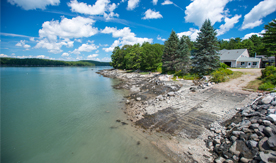
Eckelbarger Eager to Return to Classroom at Walpole Marine Station
When marine scientist Kevin Eckelbarger used to complain about administrators, his wife encouraged him to be proactive.
So he became one.
At the end of August, Eckelbarger will wrap up a 23-year gig as director of a “unique and invaluable facility” — the University of Maine’s Darling Marine Center.
Eckelbarger is the third director of the DMC, Ira Darling’s former family estate on the banks of the Damariscotta River estuary. In 1965, Darling donated his Walpole spread, which now encompasses 170 acres and 25 buildings, to UMaine to create an oceanography program.
Darling’s gift has evolved into a “science resort” — a world-renowned marine station for students and researchers from around the globe, says Eckelbarger.
“I’ll miss the spontaneity and unpredictability,” says Eckelbarger, whose days often include budget planning, fundraising, giving tours, dealing with staff and students matters, writing letters of recommendation and planning for DMC’s 50th anniversary in 2015.
“I’m an adrenaline junkie,” he says. “I don’t like being bored.”
While he’ll miss the impulsivity, Eckelbarger isn’t dwelling on the past. “Although I’m a history buff, I don’t like looking back,” he says. “I’m much more interested in the future.”
And the future includes again focusing on being a marine scientist and educator. Retirement, he says, is a few years away. “I don’t want to raise roses and I don’t golf,” Eckelbarger says.
He’ll relish delving into his deep-sea research, such as studying cells from a jellyfish from Antarctica that humans have never seen before, and working on a book about the history of marine biology. And he’ll return to the classroom to teach DMC undergraduates. “It’s (teaching) more challenging than anything I’ve ever done,” he says.
This fall, Eckelbarger will instruct a four-credit course on the biology of marine invertebrates and a one-credit undergraduate seminar that preps students to plan for a career, apply to graduate school and jobs and train for interviews.
Eckelbarger knows a thing or two about interviewing. He did three site visits before taking the director’s job at DMC; he says he wanted to make sure it would be a good fit.
Facilities improvement was a prime focus when Eckelbarger started in 1991. With National Science Foundation grant funds and money from the Darling Trust, additions have included two classrooms, a SCUBA dive building (he remembers when divers changed their gear in their trucks), a vessel operations building, a new library, a dormitory/dining hall, the 42-foot research vessel Ira C. and a two-story flowing seawater laboratory for aquaculture research. In addition, nearly every original building has been renovated and many laboratory instruments have been replaced or upgraded.
The DMC is a “window to the sea,” says Eckelbarger, an ideal location at which to earn a marine science degree. He praises the 20-year-old Semester By the Sea program that immerses students in marine life. Professors recognized for their groundbreaking research lead field trips dictated only by the tides.
Eckelbarger says he’s also proud of the DMC’s connection with the community including free public tours and nature walks, as well as its K–12 marine science outreach programs for hundreds of local schoolchildren. “It’s important,” he says. “They gain a life perspective and learn about marine ecosystems and where food comes from and about pollution and overfishing.”
Living and working on the ocean are a bit removed from where Eckelbarger grew up on a farm in Goshen, Ind., site of the second-largest county fair in the country and where Walmart provides covered stables for horses of Amish customers.
Eckelbarger says he’s honored to be associated with DMC faculty who have made and are making important contributions to ocean science, from shellfish aquaculture to remote sensing oceanography.
Mary Jane Perry, professor in the School of Marine Sciences, will be interim director of the DMC, which is a part of UMaine’s College of Natural Sciences, Forestry, and Agriculture.
Contact: Beth Staples, 207.581.3777, beth.staples@umit.maine.edu
